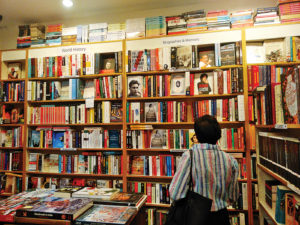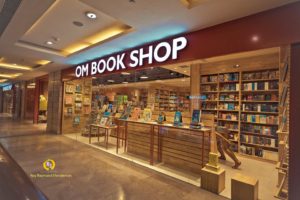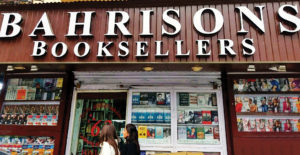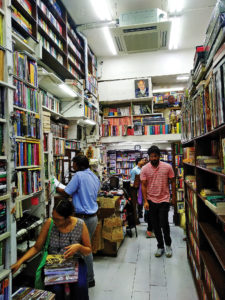Brick-and-mortar bookstores are surviving but the space allotted to books is shrinking as cafes within their premises attract more footfall. Also, they tend to do better in malls than in older markets
Anyone familiar with the iconic Full Circle book store in Khan Market would be taken aback on stepping into the redesigned store. Café Turtle, that used to be on the second floor, now occupies pride of place on the ground floor.
The café has always attracted customers who enjoy a good read while sipping on a cup of coffee. Things changed two months ago as the café was made more accessible, and the bookstore was reduced to half its size.
This is not a rare example of a bookstore being relegated to the background, if not completely shut down. In the past few years, Delhi has seen the closure of quite a few book stores like Galgotias, Fact and Fiction and Bookworm. This brings us to the pressing debate, are book stores slowly dying?
While the resizing of stores and the extinction of physical catalogues are indications of a change in lifestyles and reading preferences, all is not lost. Patriot takes a look at some of the popular stores to see how they are doing in these turbulent times.
Taking a hit

A representative from the Crossword chain, that once had almost a hundred stores across India, says that their sales are not what they used to be as they are experiencing a ‘flat’ period in their economy.
Sales of fiction titles has gone down quite a bit, with cookbooks, self-help, spiritual and mythological titles dominating. Children’s books are the biggest sellers, contributing 43% of the total profit of this book chain.
Crossword has also started selling non-book items like comic book merchandise, stationery, and even Kindles – which contributes a major share in their sales, he says.
According to him, there are now 84 stores across 34 cities in the countries. In 2015, they had 96 stores in 33 cities. So, in three years, the count has gone down by 12 —even though the number of cities has increased.
The average size of the Crossword bookstore is 2,000-3,000 sq ft — a size that has significantly come down in the past few years.
The next batch of stores that the chain plans to open are what they call “shop in shop”. This will be a store inside a Shoppers’ Stop outlet, so that people visiting it can also come in to check out the books.
This may be a good survival strategy, as malls are a better bet for any retailer than older markets. But mall authorities sometimes increase the rent of shops to quite a hefty amount, which they are unable to pay, “since the profit from a bookstore is obviously not that high compared to other products”. That is why they have been forced to either reduce the space, or completely shut the shop.

One of the most frequently visited bookstores in Delhi is the Oxford Bookstore in Connaught Place, that houses the famous Cha Bar, a café inside the bookstore. Especially on weekends, one would find the café jampacked. People wait outside just to get a seat there.
The bookstore, however, remains almost empty, with few readers here and there browsing through the shelves. The Cha Bar seems to be the primary attraction for visiting this place.
Crossword has also started opening coffee shops in a few of its stores, even partnering with Café Coffee Day. “Coffee shops occupy 750-800 sq ft of area in a 3,000 sq ft shop,” the representative says. This, he adds, is an attempt to attract more customers to the stores.
Among their non-book merchandise, Crossword has even started selling Nescafe coffee machines, which according to him have become a huge hit. “Coffee and books complement each other the best,” he repeatedly insists.
And then there is Bahrisons in Khan Market, one of the oldest bookstores in Delhi. “Two of our shops have cafes. The one in Galleria opened in December 2017 and the one in Saket opened in May 2018,” says Rajni Malhotra, owner of Bahrisons.
The café adds a great energy and coffee aroma to the bookstore! It is also a nice meeting space which preserves a peaceful, inviting setting. It has dramatically broadened our local customer base, and has brought in tourists who come in for coffee, but stay to buy a book. We also have book club meets as well as other events.
Tough economics

“We had a shop in a Mumbai street dominated by jewellery shops. The owner of the plot asked for a rent in line with what jewellery shops could afford. So we had to reduce our space,” says the representative. The iconic Crossword shop at Elgin Road, Kolkata shut shop because of surrounding retailers being able to pay higher rents.
The representative claims that the footfall in their bookstores across India used to be 10 lakh a month, 75% of whom were buyers. This, he admits, has come down in the past few years. Consumer preferences are also affected by the alternative means of entertainment online. “With the recent hit Netflix series Sacred Games and Leila, we saw a rise in footfall to demand the books those series are based on,” he adds.
The advent of e-commerce portals Amazon and Flipkart also caused bookstores to take a hit initially, but Crossword, for one, found a way to fight back. “We came up with our own web portal Crossword.in, where we also give discounts that match Amazon and Flipkart,” claims the Crossword representative.
Booksellers aver that the culture of people coming to the bookstore and buying books after spending a leisurely browsing session is fading away. However, there still are loyal customers, and not everyone gives in to the temptation to sit at home and order online. A regular at Full Circle in Khan Market, Harshita enjoys the ambience of the store and the feel of the place. “I come at least once a week to the bookstore. If anything catches my eyes, I buy it from here.”
However, she still prefers buying from online platforms like Amazon since there is quite a price difference. “There is a minimum of Rs 100 discount on each book. But I still like coming to stores to touch the book and get the feel of the place,” adds Harshita.
Browsing through books at Full Circle, Nishita who is in the city for an internship, admits that she hardly buys anything from bookstores. “I like visiting bookstores but I only check the stores to buy books online,” she adds.
Ajay Mago, owner of the chain Om Book Shop, adds that the biggest hit the industry suffered was when e-commerce portals came in. “They came to kill the industry. Sales were affected, especially since people from smaller towns used to come to places like Delhi to shop. That stopped completely. But the worst thing was when they started discounting.”

The major product that the e-commerce sites was selling back then was books. Note that Flipkart and Amazon initially started off as online bookselling portals.
Still going strong
With a long list of books on International Relations in hand, Divya carefully scrolls through each shelf of Bahrisons Booksellers in Khan Market. Working in a government office Divya likes to have hard copies of books at her desk for easy reference. “Whenever I am looking for any book, I am assured that I will find it in Bahrisons. Even if I don’t find it right away, they always get it for me,” she adds.
Even though she reads on Kindle she has been a loyal customer at this bookstore because she can find it all here.
Turning 66 this October, Bahrisons has a steady flow of customers some of whom have been loyal from the very beginning. Despite updating them to keep in tune with the changing times, they still haven’t lost their charm.

“Over the years, we have expanded our book selection extensively and made the environment tranquil and appealing to readers. We have a dedicated store just for kids and young adult readers. All the shops are equipped with well trained staff who have knowledge of the books. The shops are all user friendly and have beautiful displays. From time to time, we also host author signings and offer the autographed copies to the customers,” says Malhotra.
When asked if she sees interest in book stores among the general public slowly fading away she completely disagrees. “We have expanded the number of stores we have only because there was a need for more brick-and-mortar bookshops and people continue to enjoy the ambience and facilities of a good book shop,” adds Malhotra.
This can be clearly seen as the store entertained a lot of customers even on a Tuesday afternoon. A lady who seemed to be a regular customer at the store, walked in and asked for a copy of Sidharth’s Celestial Beings, and the staff promptly climbed a ladder to get her the copy. The same goes for all other staff as they remain busy throughout, guiding customers.
“I still prefer buying physically from bookstores than online, because here I can scroll through a number of titles and pick and choose what I want to buy,” says Kishlay, a college student, as he browsed through the shelves of Bahrisons. “You go online for a particular title. Whereas at a bookstore, the options are in front of you are varied,” adds Kishlay, who frequents the store.
Looking hopeful
Om Books’ Mago believes that now the time is not the best for bookstores, but the business of selling books is definitely coming back on track.

Taking us back to the time it all started he explains how the scene has been slowly evolving. An already established publishing house, the bookstore chain opened later in 1998, initially in high street areas. Then with the shifting of trends to mall culture they opened their first store in a mall (MGF Metropolitan Mall in Gurgaon).
“Since then all the stores we have opened across the country are in malls. You won’t go wrong if the mall is right. Every brand in a mall drives in traffic and everyone benefits out of it,” he explains.
According to Mago, people started shifting back to bookstores again from 2016. “As an avid reader myself, I know for sure that a book is one thing that people prefer to touch and browse before they actually buy. So, things are slowly coming back on track. We are very positive that the bookstore will never fade away.”
When asked about stores cutting down their sizes to half, he adds that the resizing of book stores is now a trend. “We have some stores that are 1,500 sq ft while others are 3,000 sq ft. What I feel is that the size does not double the sale. People in the industry have now realised this that it is not needed.”
With an average of 150-200 footfall in any of their stores on weekdays which doubles on the weekends, Mago states that 70% of that number turn out to be buyers.
Launching a new store in Bengaluru a few days back, they have 12 stores across the country. Planning to now open new stores in slightly smaller towns as well, things are looking up for them.





